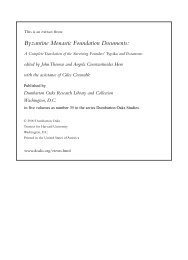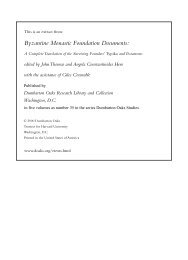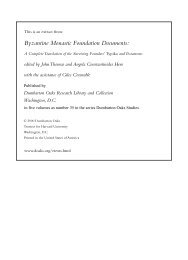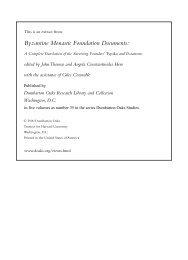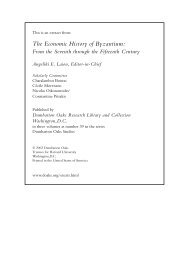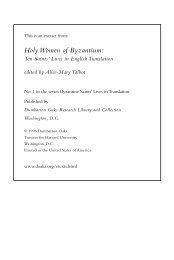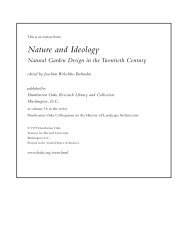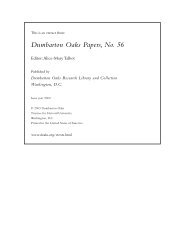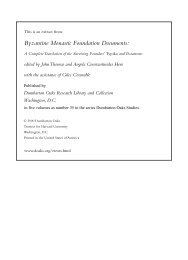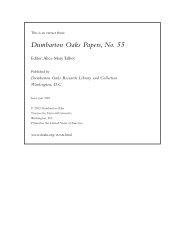28. Pantokrator - Dumbarton Oaks
28. Pantokrator - Dumbarton Oaks
28. Pantokrator - Dumbarton Oaks
You also want an ePaper? Increase the reach of your titles
YUMPU automatically turns print PDFs into web optimized ePapers that Google loves.
<strong>28.</strong> PANTOKRATOR<br />
own superior, but they were to be governed directly by the superior of the <strong>Pantokrator</strong> monastery<br />
instead. Each of them had [64] their own stewards to look after their financial affairs, though<br />
these officials were subordinated to one of the stewards of the main monastery. A seventh dependency,<br />
Bordai, appears [65] only in the inventory towards the end of the document.<br />
2. The Protectorate<br />
As another apparent afterthought, the emperor adds [70] an important constitutional feature by<br />
designating his son the basileus Lord Alexios as the defender and supporter of the monastery. His<br />
untitled position was analogous to that of the protectress in (27) Kecharitomene [3]. The emperor<br />
intends that the office should be inherited by the “leading member of our family.” He cautions that<br />
the incumbent had no license to exploit his position to seize any of the assets of the foundation.<br />
3. Election of the Superior<br />
Evidently the emperor had already chosen the incumbent superior, and like his mother Irene, the<br />
author of (27) Kecharitomene [11], he must have considered this to be his lifetime prerogative. As<br />
for later, he instructs [24] that the superior will select from among the monks not only of the<br />
<strong>Pantokrator</strong> but also of its dependent institutions three candidates worthy to be his successor.<br />
After the superior’s death, the community was to discuss the nominations and select the new<br />
superior by consensus. If there was no agreement on one of the nominees, the determination was<br />
to be made by a random choice of lots by an unlettered member of the community. The emperor<br />
also provides for one of his successors to add the name of an especially worthy but hitherto<br />
overlooked candidate to the list of those being considered, though this had to be done at the<br />
instigation of a member of the community, and even then the emperor’s nomination was still not<br />
formally determinative.<br />
4. Installation of the Superior<br />
The emperor provides [25] regulations for the installation of the new superior. The patriarch was<br />
to issue an ordinance (pittakion) instructing one of the bishops resident in the capital to install the<br />
nominee “so that strict adherence to the canon may be maintained” and “the independence of the<br />
monastery may in no way be disturbed” as a result of this bishop’s sphragis of the new superior.<br />
Earlier, especially when relations between founders and the ecclesiastical hierarchy were<br />
bad, the canonical prerogatives of the local bishop or (in Constantinople) the patriarch with respect<br />
to the superior’s installation were often simply ignored, as in (22) Evergetis [13]. Later,<br />
when there had been some improvement, some founders like the author of (30) Phoberos [35]<br />
were willing to recognize the hierarchy’s prerogatives. In (28) <strong>Pantokrator</strong> [25] the emperor chooses<br />
a middle course, distancing the patriarch by one remove from the installation ceremonies.<br />
5. Role of the Superior<br />
Though the emperor is not anxious to say so forthrightly, by default the superior is [26] the effective<br />
master of the foundation here, just as in other reform monasteries. Unlike other cautious<br />
founders such as the author of (23) Pakourianos [5], [18], however, the emperor was willing to<br />
grant [23] a considerable amount of latitude to the superior to make necessary changes in the daily<br />
life of the monks or the liturgical rituals in the church on account of an individual’s illness or other<br />
good reason. We have already mentioned his concession [12] to the superior allowing him to<br />
[ 731 ]




